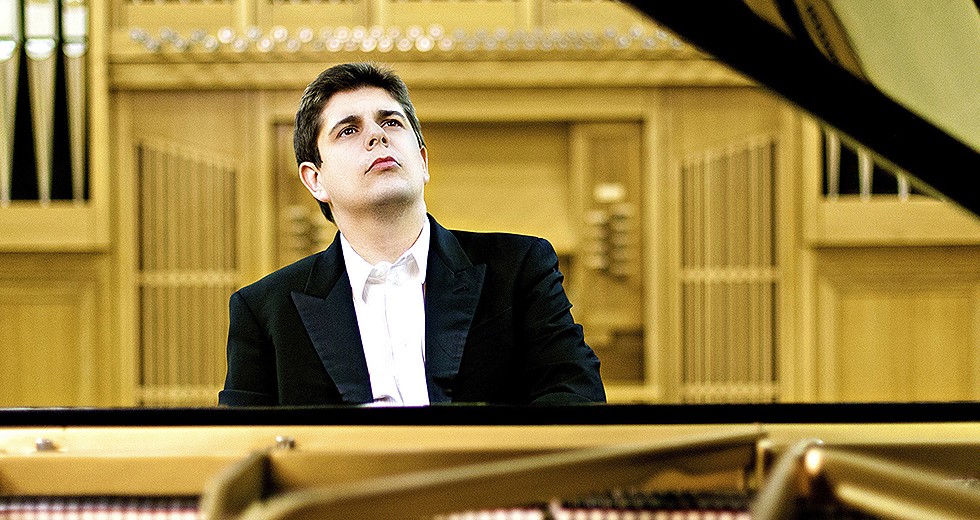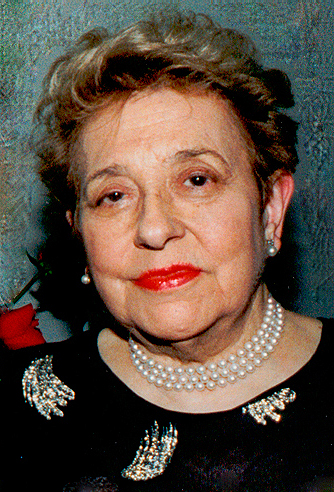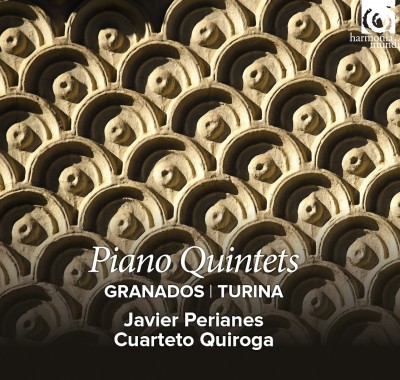
Nobody needs to remind pianist Javier Perianes that Alicia de Larrocha was Spain’s greatest keyboard artist. He hears it all the time. When he made his debut last year with the San Francisco Symphony, the concertmaster started to discuss the last Spanish pianist to play with that orchestra. “I told him, ‘Don’t say the name,’” Perianes said. “Don’t do that, because I don’t need that extra pressure. I know it was her, and I know she was absolutely outstanding.’” But if Perianes’ international career continues its steady climb, his name should be right next to hers in a decade or two.
In May, Chicago Symphony Orchestra audiences will hear Perianes in two different concert formats. During subscription concerts on May 12 and 14, he will join guest conductor Charles Dutoit in Manuel de Falla’s Nights in the Gardens of Spain. In addition, the pianist will participate in two Beyond the Score programs May 13 and 15, in which he and Dutoit will dissect this vibrant, evocative 1916 work, which the composer originally conceived as four nocturnes for piano.

Alicia de Larrocha (1923-2009) continues to cast a giant shadow over the world of classical pianists.
Rather than a standard concerto, it is what the Spanish composer called “symphonic impressions” for piano and orchestra. “And of course, the spirit of the piece is exactly that,” said Perianes, who recorded it in 2011 with the BBC Symphony. “The piano is another instrument inside the orchestra. Sometimes the piano has to shine, has to play like a soloist. Sometimes the piano has to play like an accompanist with other instruments from the orchestra.”
While the work is infused with the sounds of flamenco and other Spanish folk music, it also shows the influences of Maurice Ravel, Claude Debussy and the musical scene of Paris, where Falla lived from 1907 to the beginning of World War I.
There was no turning point, no dramatic event that set Perianes on the career path that has taken the rising star to many of the world’s top concert halls. In retrospect, he can see that it has been a “logical and very natural process,” with one set of concerts leading to the next. “Now, I’m in a position to enjoy what is happening,” he said, “because I have been working and preparing myself.”
Giving a significant boost to Perianes’ career, as he readily acknowledges, has been a connection to the respected record label Harmonia Mundi. He first recorded for its Spanish offshoot, which focused on that country’s artists and music. Instead of predictable selections by Falla or Isaac Albéniz for his first album in 2006, he chose to focus on the solo piano music of Frederic Mompou (1893-1987), a little-known Catalan composer. Soon thereafter, Harmonia Mundi eliminated its Spanish division but retained its ties to the pianist. Perianes has gone on to record pieces by such composers as Franz Schubert, Claude Debussy and Felix Mendelssohn, and other projects are in the works. “It’s a fruitful and beautiful collaboration,” he said. “I feel like I’m part of a family — really.”
In May 2015, Perianes released a live recording featuring Edvard Grieg’s famed Piano Concerto in A Minor, Op. 16. Harmonia Mundi came to Perianes with the idea of spotlighting the work, and it just happened that he had an upcoming tour planned with noted Finnish conductor Sakari Oramo and the BBC Symphony that featured the concerto. So plans were made for the label to record his London concert with the orchestra and then see how it turned out. “I’m very happy,” he said. “I felt it was very fresh and I felt some kind of improvisation there in the best way — very free, very flexible. Oramo did a great job, and we were all very happy, so the company decided to go ahead.”
The release has received positive reviews, including this complimentary take from Guardian music critic Erica Jeal: “The romantic expansiveness that marks their interpretation overall is tempered by playing from both pianist and orchestra that is as crisp and highly charged as one could want. Paired with this is a selection of 12 of the solo Lyric Pieces, recorded in the studio, all individually characterized but reaffirming Perianes’ warm, spacious approach to Grieg’s music.”

Javier Perianes’ latest release is a chamber music disc that features the works of two Spanish composers.
Then in November, the pianist released another recording that could hardly been more different: a chamber music album with the up-and-coming Quiroga Quartet. This album features the obscure piano quintets of Spanish composers Enrique Granados and Joaquín Turina, and it marks the first time that the two works have been recorded together by Spanish musicians. “We did it, because we think we owe it to the music,” Perianes said. “Being Spanish, we also have a tradition that we have to respect and honor.”
Another recent milestone in Perianes’ career came Feb. 1 when conductor Semyon Bychkov and the vaunted Royal Concertgebouw Orchestra were visiting Madrid, where the pianist lives. Around 4:30 p.m., while he was doing a photo shoot for the BBC Music Magazine, Perianes got a frantic call from the orchestra’s management, wondering if he could substitute that evening for Jean-Yves Thibaudet, who was forced to cancel because of illness. To make it work, Perianes had 75 minutes to get to the Auditorio Nacional for a pre-concert rehearsal of Beethoven’s Emperor Concerto. “I said, ‘OK. This is one of those chances that happens maybe one time in your life,’” he said. “So let’s go ahead.”
He sent a friend to his house to get his concert apparel and the score, so he could look it over before performing the piece from memory. It turned out to be a wonderful experience. “It’s one of the great orchestras in the world,” he said, “and they showed me why. It was flexible, very easy to play with them. It was very exciting, and at the same time, one of the most amazing experiences in my musical life, no doubt of that.”
Perianes might not yet have the name recognition of the legendary Alicia de Larrocha. But it’s stand-out incidents like this one that take him a step closer.
Kyle MacMillan, former classical music critic of the Denver Post, is a Chicago-based arts journalist.